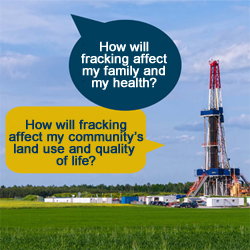Fracking, superstorms, and science: What
you don't know can hurt you
How will my city hold up against the next superstorm? What's the truth about the effect of fracking on my drinking water? These days our communities are faced with more and more complex issues. To make smart decisions that protect the health, welfare, and environment of our communities, we need access to current, accurate scientific information. With tools like our recently-released fracking information toolkit that helps citizens and policy makers make informed decisions on hydraulic fracturing (fracking), and our upcoming webcasted forum on how communities can improve prediction, response, and recovery in the face of extreme weather events—UCS is working to integrate science into community decision making so we can better plan for a healthier and safer future. —Karla
Recent advances in hydraulic fracturing ( or “fracking”) technology leading to a rapid expansion in domestic oil and gas production. The pace of growth is driving many communities to make decisions without access to comprehensive and reliable scientific information about the potential impacts of hydraulic fracturing on their local air and water quality, community health, safety, economy, environment, and overall quality of life.
 If
you are an active citizen in a community facing decisions about
fracking, this toolkit is for you. It provides practical
advice and resources to help you identify the critical questions to
ask and get the scientific information you need when weighing the
prospects and risks of shale oil or shale gas development in your
region.
If
you are an active citizen in a community facing decisions about
fracking, this toolkit is for you. It provides practical
advice and resources to help you identify the critical questions to
ask and get the scientific information you need when weighing the
prospects and risks of shale oil or shale gas development in your
region.
This toolkit can improve decision making on fracking by helping you to:
- Identify critical issues about the potential impacts of fracking in your area, and how to obtain answers to your questions
- Distinguish reliable information from misinformation or spin—and help your neighbors and local decision makers do the same
- Identify and communicate with scientists, journalists, policy makers, and community groups that should be part of the public discussion
- Identify and engage with the key actors in your community to influence oil and gas policy at the local and state level
The Union of Concerned Scientists is the leading U.S. science-based nonprofit organization working for a healthy environment and a safer world. Founded in 1969, UCS is headquartered in Cambridge, Massachusetts, and also has offices in Berkeley, Chicago and Washington, D.C. To subscribe or visit go to: http://www.ucsusa.org
http://www.ucsusa.org/center-for-science-and-democracy/events/fracking-forum-toolkit.html